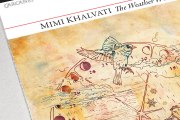“The Weather Wheel”: An interview with Mimi Khalvati

Back in January of 2015 I met with Mimi in her flat in Stoke Newington, full of questions about (and barely concealed admiration for) her latest collection, The Weather Wheel, which had been published only a few months earlier. The hour-long interview was printed in the 4th issue of HARK magazine (March 2015). Here I reprint the interview and include the pieces which Mimi read, with the kind permission of […]




